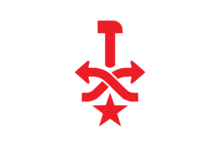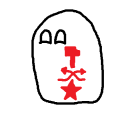No edit summary |
No edit summary |
||
| Line 440: | Line 440: | ||
#mw-content-wrapper {width: 1305px;max-width: 100%;padding: 0 0px;} | #mw-content-wrapper {width: 1305px;max-width: 100%;padding: 0 0px;} | ||
#mw-content, #section {background: #323232;}: | #mw-content, #section {background: #323232;}: | ||
#cosmos-pageBody-content {width: -webkit-calc(50% - 160px);width: calc(75% - 0px);} | #cosmos-pageBody-content {width: -webkit-calc(50% - 160px);width: calc(75% - 0px);} | ||
.portable-infobox.pi-background {background-color: #2b2b2b;} | .portable-infobox.pi-background {background-color: #2b2b2b;} | ||
Latest revision as of 16:31, 14 October 2024
Not to be confused with
Capitalist Communism or
Liberal Socialism.
"There is but one mode by which man can possess in perpetuity all the happiness which his nature is capable of enjoying, - that is by the union and co-operation of all for the benefit of each."
Market Socialism, clipped to MarkSoc, is an economically ![]() left-wing ideology that is unique as a leftist ideology in that it is one of the few that views markets as beneficial. Market Socialism was born in the 18th Century, when what would later be known as
left-wing ideology that is unique as a leftist ideology in that it is one of the few that views markets as beneficial. Market Socialism was born in the 18th Century, when what would later be known as ![]() Classical Liberalism and
Classical Liberalism and ![]() Mutualism had their first lovechild, who was first written about in The Wealth of Nations by Adam Smith.
Mutualism had their first lovechild, who was first written about in The Wealth of Nations by Adam Smith.
MarkSoc wants widespread workers' self-management within the framework of a market economy. Each worker can either directly own their workplace or vote to elect their managers.
History
Market Socialism emerged as a response to ![]() classical liberalism, in fact, the most widely known Market-Socialist literature, the Principles of a Political Economy is a series of essays by John Stuart Mill as a direct response to the Wealth of Nations.
classical liberalism, in fact, the most widely known Market-Socialist literature, the Principles of a Political Economy is a series of essays by John Stuart Mill as a direct response to the Wealth of Nations.
Conceptions
Employee Funds
The wage-earner fund was a ![]() Swedish proposal by
Swedish proposal by ![]() Rudolf Meidner to transition from a
Rudolf Meidner to transition from a ![]() social democratic economy to a
social democratic economy to a ![]() market socialist one. The companies with more than 50 employees would have 20% of their profits taxed to allow the funds to buy up shares in the companies. Since the trade union representatives control those funds, collective employee ownership will be attained after two decades.
market socialist one. The companies with more than 50 employees would have 20% of their profits taxed to allow the funds to buy up shares in the companies. Since the trade union representatives control those funds, collective employee ownership will be attained after two decades.
 Illyrian model
Illyrian model
Prominent economists in ![]() Yugoslavia, such as Jaroslav Vaněk and Branko Horvat, advocated for this type of Market Socialism. Workers would be the owners in their enterprises, and daily management would abide by one worker, one vote principle. Profits from the worker co-ops will directly compensate the employees within. Each labor-managed firm will compete in open and free markets, and they may be able to form cooperative federations. It's possible to have a
Yugoslavia, such as Jaroslav Vaněk and Branko Horvat, advocated for this type of Market Socialism. Workers would be the owners in their enterprises, and daily management would abide by one worker, one vote principle. Profits from the worker co-ops will directly compensate the employees within. Each labor-managed firm will compete in open and free markets, and they may be able to form cooperative federations. It's possible to have a ![]() laissez-faire form of market socialism with this, similar to
laissez-faire form of market socialism with this, similar to ![]() Mutualism.
Mutualism.
 Titoism/Self-governing socialism
Titoism/Self-governing socialism
Like the Illyrian model, workers' self-management was also implemented via worker councils. The difference was that government intervention in the economy was far-reaching. The workers didn't own the firms they worked in, or as the 1974 constitution put it, "...no one has rights of ownership over the social means of production..." Like many other Market Socialists, Titoism believed in a ![]() strong welfare state for the citizens.
strong welfare state for the citizens.
 Lange–Lerner theorem
Lange–Lerner theorem
There would be a market for final goods, while the state uses a central planning board to allocate the means of production. The government will set prices for capital goods by trial and error until they reach the equilibrium between supply and demand. The workers would still democratically manage the state-owned enterprises, and there would be social dividends thanks to the socially-owned capital and natural resources. Despite being called "market socialism" by its founders, Lange Model was more of a market simulated planning or a semi-planned economy.
 Municipal Socialism
Municipal Socialism
Municipal Socialism is a variant of Market Socialism that advocates the use of local government to further social and public ownership of utilities. It predominately hails from the ![]() UK, specifically in the city of Preston.
UK, specifically in the city of Preston.
Stock Socialism
A variant of socialism in which social ownership of the means of production and workplace democracy is achieved via worker ownership of stocks. One proponent of a similar system was Pranab Bardhan who conceptualised a form of socialism in which workers had equal share of stocks. There is another variant of this in relation to the transition to a socialist economy and that stage.
Personality
MarkSoc is quite disdainful of other, more radical socialists, as well as ![]() capitalists. They look down on other
capitalists. They look down on other ![]() leftist ideologies for preventing the beneficial aspects of markets from proliferating in a
leftist ideologies for preventing the beneficial aspects of markets from proliferating in a ![]() socialist system, as well as looking down on
socialist system, as well as looking down on ![]() rightist ones for the perceived corruption and suffering in their systems.
rightist ones for the perceived corruption and suffering in their systems.
MarkSoc thinks they are the ultimate ideology and insists on everyone reading 1000 pages of economic theory to prove their point. They sometimes get caught up in their own self-importance, but they truly care about trying to help the workers of the world.
How to Draw

- Draw a ball.
- Fill the ball white.
- Draw at the top a red hammer.
- Below that, draw two red arrows crossing each other.
- Below that, draw a red star.
- Add the eyes, and you're done!
| Color Name | HEX | RGB | |
|---|---|---|---|
| Red | #EC1D26 | 236, 29, 38 | |
| White | #FFFFFF | 255, 255, 255 | |
Relationships
Friends
 Democratic Socialism - They're fellow socialists and supporters of cooperatives.
Democratic Socialism - They're fellow socialists and supporters of cooperatives. Mutualism - My more wacky influence.
Mutualism - My more wacky influence. Libertarian Market Socialism - My freedom-loving descendent.
Libertarian Market Socialism - My freedom-loving descendent. Syndicalism - Workforce unionization and decentralized worker organizations? Based!
Syndicalism - Workforce unionization and decentralized worker organizations? Based! Distributism - Pretty much on the same page, but they're a little more religious than I am.
Distributism - Pretty much on the same page, but they're a little more religious than I am. Titoism - My most successful form, but quit it with the excessive meddling in the cooperatives.
Titoism - My most successful form, but quit it with the excessive meddling in the cooperatives. Alter-Globalism - The global south shall not be exploited!
Alter-Globalism - The global south shall not be exploited! Democracy - Worker cooperatives are great at providing you!
Democracy - Worker cooperatives are great at providing you! Goulash Communism - The market reforms to improve living standards are good, but you could've incentivized more workers' self-management.
Goulash Communism - The market reforms to improve living standards are good, but you could've incentivized more workers' self-management. Yellow Socialism - A bit too
Yellow Socialism - A bit too  reactionary social-wise, but otherwise he's cool.
reactionary social-wise, but otherwise he's cool. Liberal Socialism - My liberal child.
Liberal Socialism - My liberal child. Guild Socialism - Basically me but Medieval-inspired and organized along professional lines.
Guild Socialism - Basically me but Medieval-inspired and organized along professional lines. Kosyginism - If only you fully implemented the reforms.....
Kosyginism - If only you fully implemented the reforms.....
Frenemies
 Capitalism - Sorry dude, your markets are cool, but your bosses are not. We also both like Adam Smith but for VERY different reasons.
Capitalism - Sorry dude, your markets are cool, but your bosses are not. We also both like Adam Smith but for VERY different reasons. Classical Liberalism - Same as above, I also enjoy Smith's works, but you're still a capitalist.
Classical Liberalism - Same as above, I also enjoy Smith's works, but you're still a capitalist. Marxism–Leninism - I fit the official definition of "Socialism" so don't call me a fake socialist! However, Raul Castro, Tito, Kadar and Kosygin are based, and so artels and cooperatives of Stalin era, which were banned by Khrushchev.
Marxism–Leninism - I fit the official definition of "Socialism" so don't call me a fake socialist! However, Raul Castro, Tito, Kadar and Kosygin are based, and so artels and cooperatives of Stalin era, which were banned by Khrushchev. Austrian School - Thanks for the ECP, but your unregulated capitalism is horrific.
Austrian School - Thanks for the ECP, but your unregulated capitalism is horrific. Social Liberalism - We share a lot of the same ideals, and we both like John Stuart Mill, but doesn't provide practical solutions.
Social Liberalism - We share a lot of the same ideals, and we both like John Stuart Mill, but doesn't provide practical solutions. Capitalist Communism - We both want free markets in a socialist state, but you come off as rather contradictory and not really making much sense.
Capitalist Communism - We both want free markets in a socialist state, but you come off as rather contradictory and not really making much sense. Dengism - You are not me! You are just state capitalism with a socialist mask! But even so, reforming the Maoist bureaucracy was based.
Dengism - You are not me! You are just state capitalism with a socialist mask! But even so, reforming the Maoist bureaucracy was based. Anarcho-Syndicalism - I love your brother, but why do you want to get rid of the government?
Anarcho-Syndicalism - I love your brother, but why do you want to get rid of the government? Social Corporatism - Better than regular
Social Corporatism - Better than regular  corporatism, but still too hierarchic.
corporatism, but still too hierarchic. Leninism - You understand that cooperatives are a good way to transition into socialism, which is based, I also like the
Leninism - You understand that cooperatives are a good way to transition into socialism, which is based, I also like the  New Economic Policy, but your rejection of reform is something I wouldn't like, in fact, reform is ideal in achieving socialism.
New Economic Policy, but your rejection of reform is something I wouldn't like, in fact, reform is ideal in achieving socialism. Honeckerism - Still too planned for my tea, but it's good that you took a step to embrace some market socialist ideals.
Honeckerism - Still too planned for my tea, but it's good that you took a step to embrace some market socialist ideals.
 Other Warsaw Pact market socialists
Other Warsaw Pact market socialists 
 - Similar to the above.
- Similar to the above. Juche - I like some of your economic ideas, but the totalitarianism and protectionism is cringe.
Juche - I like some of your economic ideas, but the totalitarianism and protectionism is cringe. State Socialism - We are both socialists, but you should lessen your authoritarian rhetoric. A planned economy is stagnant and your tendency to be overly centralized and overly bureaucratic in dealing with economics tends to hurt the working class more than it helps them. Although we sometimes overlap, mostly in Eastern Europe.
State Socialism - We are both socialists, but you should lessen your authoritarian rhetoric. A planned economy is stagnant and your tendency to be overly centralized and overly bureaucratic in dealing with economics tends to hurt the working class more than it helps them. Although we sometimes overlap, mostly in Eastern Europe. Social Democracy - You're far from horrible in modern times, but I kinda miss when you were a lot closer to me rather than a friendlier version of
Social Democracy - You're far from horrible in modern times, but I kinda miss when you were a lot closer to me rather than a friendlier version of  him.
him. Third Way - You're a kinder version of
Third Way - You're a kinder version of  them with some of
them with some of  him too, but you still seem more exploitative.
him too, but you still seem more exploitative. Social Authoritarianism - You're sometimes too moderate economically even getting close to
Social Authoritarianism - You're sometimes too moderate economically even getting close to  him; but
him; but  Revolutionary Government of the Armed Forces' Yugoslavia-like socialist self-management system was really based.
Revolutionary Government of the Armed Forces' Yugoslavia-like socialist self-management system was really based. Nordic Model - Again, not bad, though I wish you followed through with Rudolf Meidner's ideas.
Nordic Model - Again, not bad, though I wish you followed through with Rudolf Meidner's ideas.
Enemies
 Fascism - A corporatist economy is not even close to what I advocate for, especially with the class collaboration that it requires.
Fascism - A corporatist economy is not even close to what I advocate for, especially with the class collaboration that it requires. Neoliberalism - This is what exclusive capitalism leads to.
Neoliberalism - This is what exclusive capitalism leads to. The Manager - No...NO!!!
The Manager - No...NO!!! Pinochetism - Exclusivist organizations and oligarchy? In THIS land? I think not!
Pinochetism - Exclusivist organizations and oligarchy? In THIS land? I think not! Khrushchevism - Banning cooperatives in 1956 was the reason why the Soviet economy stagnated!
Khrushchevism - Banning cooperatives in 1956 was the reason why the Soviet economy stagnated! The Board of Directors - This is what
The Board of Directors - This is what  he wants over the workers!
he wants over the workers! Hoxhaism - Stop calling any socialist ideologies that stray even slightly from Marxism–Leninism revisionist!
Hoxhaism - Stop calling any socialist ideologies that stray even slightly from Marxism–Leninism revisionist! State Capitalism - Stop pretending to be me! We are opposites.
State Capitalism - Stop pretending to be me! We are opposites. Corporatism - Same as above.
Corporatism - Same as above. Italian Left Communism - Why do you hate me?
Italian Left Communism - Why do you hate me? Libertarianism - "The freer the market, freer the people", I totally agree, but you misunderstood the quote.
Libertarianism - "The freer the market, freer the people", I totally agree, but you misunderstood the quote. Anarcho-Capitalism - The free market means no capitalism.
Anarcho-Capitalism - The free market means no capitalism. Corporatocracy - You make the statement "Capitalism is anti-market" truer than anyone else.
Corporatocracy - You make the statement "Capitalism is anti-market" truer than anyone else. Objectivism - Free markets aren't about worshiping your boss or being really greedy.
Objectivism - Free markets aren't about worshiping your boss or being really greedy. PsychoCap - GET AWAY FROM ME, YOU GODDAMN RED MARKET LOVER!!
PsychoCap - GET AWAY FROM ME, YOU GODDAMN RED MARKET LOVER!!
Further Information
Notes
Literature
- Principles of Political economy by
 John Stuart Mill
John Stuart Mill - Chapters on Socialism by
 John Stuart Mill
John Stuart Mill - On the Economic Theory of Socialism by
 Oskar Lange
Oskar Lange - Market, State, and Community: Theoretical Foundations of Market Socialism by David Miller
- Why Market Socialism?: Voices from Dissent by Frank Roosevelt, David Belkin, and Robert L. Heilbroner
- After Capitalism by
 David Schweickart
David Schweickart - Democracy at Work: A Cure for Capitalism by
 Richard D. Wolff
Richard D. Wolff - Private Government: How Employers Rule Our Lives (and Why We Don't Talk about It) by Elizabeth Anderson
Online Communities
Wikipedia
- Market Socialism
- Market Socialist Economy
- Laissez-Faire Socialism
- Employee funds
- Economy of SFRY
- Socialist self-management
- Lange Model
- Labor theory of value
People
 Louis Blanc
Louis Blanc John Stuart Mill
John Stuart Mill 
 Branko Horvat
Branko Horvat Jaroslav Vaněk
Jaroslav Vaněk Erich Honecker
Erich Honecker 
 Josip Broz Tito
Josip Broz Tito 
 Richard D. Wolff
Richard D. Wolff 
 Rudolf Meidner
Rudolf Meidner
Videos
- AskProfWolff: What is the difference between market socialism and centralized socialism? by
 Richard D. Wolff
Richard D. Wolff - Can We Do It Ourselves? by Friatidningar
- Socialist Debate: Main Arguments by Adam G
- 8 Types of "Socialism" in 75 Minutes || Economic Systems Explained by LuckyBlackCat
- 8 Types of "Socialism" in 10 Minutes by LuckyBlackCat
Gallery
Portraits
-
Credit: Arksiane's drawing
-
-
-
-
"Socialist Compass" by Spade
Comics and Artwork
de:Marktsozialmus pl:Socjalizm rynkowy
- ↑ The Co-Operative Party worked extensively with New Labour both in terms of market liberalization and pushing for cooperatives in various sectors with the help of Blair and Brown.






